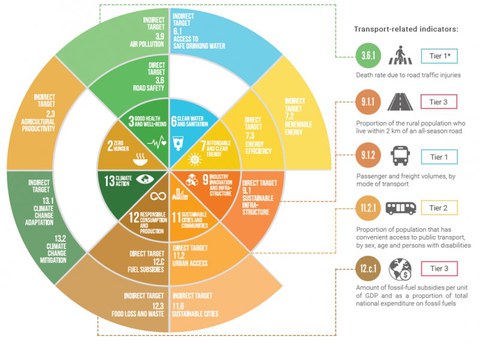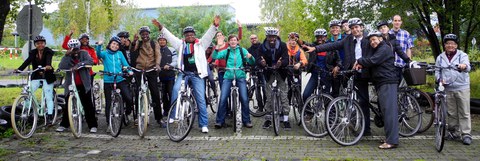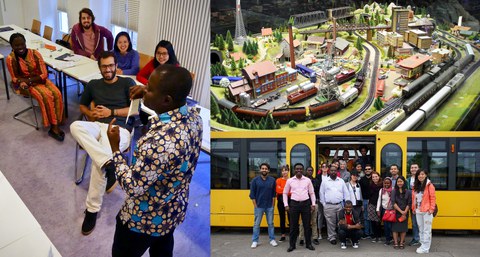81st UNEP/UNESCO/BMU International Short Course on Sustainable Mobility
ONLINE COURSE
Duration: 13 November - 09 December 2020
Motivation
Figures and definitions come from the report “Mobilizing sustainable transport for development - Analysis and Policy Recommendation from the United Nations High-Level Advisory Group on Sustainable Transport” (2016):
“Transport is not an end in itself but rather a means allowing people to access what they need: jobs, markets and goods, social interaction, education and a full range of other services contributing to healthy and fulfilled lives.”
Transport drives development, links people, connects local communities with the world, creates markets and facilitates trade. In return, sustainable transport promotes a more sustainable development. Personal and economic needs of the present can thus be met without compromising the ability of future generations to meet their own needs. For these reasons, sustainable mobility is key to the 2030 Agenda. It states that "sustainable transport systems, along with universal access to affordable, reliable, sustainable and modern energy services, quality and resilient infrastructure, and other policies that increase productive capacities, would build strong economic foundations for all countries". The agreement contains five objectives that are directly related to the transport sector and seven other targets that are indirectly related to the transport sector.
There is an urgent need for action to deal with the huge social, environmental and economic costs associated with "business as usual": every year 1.24 million people die in traffic accidents and another 3.5 million people die prematurely due to outdoor pollution, including from transport sources; 23% of energy-related greenhouse gas emissions come from transport. Road congestion is an enormous burden on the economy and currently accounts for 0.7% of GDP in the USA, 2% of GDP in Europe, 2-5% of GDP in Asia and in some cities in emerging countries even 10% of GDP , including Beijing, São Paulo and Lima.

Transport-relevant global sustainability goals
Sustainable mobility also offers enormous opportunities: improved road safety and less air pollution can save hundreds of thousands of lives each year, and carbon emissions can be reduced by 7 gigatons. The transformation to sustainable mobility requires a redirection - and not a significant increase - in infrastructure spending. It can be realised through an annual investment of around $ 2 trillion, which is equivalent to spending $ 1.4 to $ 2.1 trillion in a business-as-usual scenario. Taking into the account full costs of transportation, including fuel, operating costs, losses due to congestion and vehicle costs, sustainable mobility can save $ 70 trillion by 2050.
Course concept and objectives
The course concept follows the 'Avoid Shift Improve' approach, which is recommended by the high-ranking UN advisory group on sustainable transport as a useful framework for assessing traffic measures and for measures to support sustainable passenger and freight transport. Applying these principles will promote a combination of multimodal, collective and shared mobility solutions and sustainable transport systems. The concept of enabling is an important addition to the framework. Training participants will be empowered to pursue an integrated, holistic approach to political decisions and investment decisions. The benefits of engaging a wide range of stakeholders and funding sources are also highlighted.

Participants analyze urban traffic challenges during an excursion by bicycle during a previous course
Participants will learn from each other's experiences, present the respective national transport policies and develop sustainable processes and measures for their countries. Professors and scientists from the Technical University of Dresden and other renowned research institutions, as well as experts from industry and the German Environment Agency, will elaborate on approaches for holistic traffic planning and concepts for sustainable transport development. Topics include an analysis of the current situation, assessment procedures and manuals, alternative fuels and engines, transport planning, regional planning, pollution and noise, fuel consumption and climate change, public transport, walking, cycling as well as methods for measuring access and the needs of the population in terms of mobility. This interdisciplinary short course provides a solid background knowledge combined with workshops, participatory teaching methods and on-site inspections.

Some impressions from previous trainings dealing with sustainable mobility
Participants are enabled to acquire professional skills to support the environmental policy of their respective countries with regard to transport aspects and to initiate their own projects on all administrative levels. Participants will also develop an action plan for a challenge in their field of work, applying the course contents and taking into consideration inspiration received from facilitators and fellows during the course. This plan shall be implemented autonomously upon return and thus facilitate the transfer of the newly acquired knowledge into the day-to-day activities.
Target groups
This course is aimed primarily at senior management experts with a technical background in traffic and urban planning. The training is suited for experts on a managerial level and decision-makers with tasks in environmental-related planning, coordination and management in ministries, authorities, local government and non-governmental institutions of developing countries, including newly industrialised economies. We expect a high motivation to explore concepts for sustainable mobility - as well as working towards implementing them. A first university degree (BA, BSc, e.g.), adequate communication skills in English language and the nomination by the delegating institution are mandatory.
Important note: Courses are full-time and attendance of lectures and excursions is compulsory. It is not possible to pursue regular employment at the same time. In the application process, we therefore request confirmation from the employer that the candidate is exempted from his regular duties for the duration of the course. We strongly advise against applying for the courses if the employer does not fully agree to the exemption from the job for the time of the course.
Application and participation
Our International Steering Committee selects the 21 participants of this course by August 2020. Participants stay in our comfortable private studio apartments and receive a stipend to cover basic living expenses. Flights, health insurance etc. will be provided. Our course office provides further manifold assistance. Participants successfully completing this course will be awarded a Certificate of Proficiency in Sustainable Mobility.
Download the overview brochure for the UNEP/UNESCO/BMU course program.
For more information on the application process, please visit the FAQ section.
